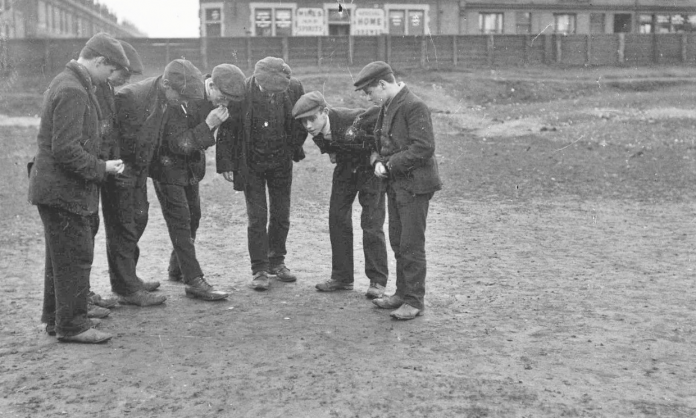By Martin Gleeson
Heads or Harps
There is an old gambling game played by throwing a coin towards a mark (called a moth) that has been popular for many years throughout the world. However, when I was growing up in a Co. Tipperary town in the 1950s, another game also called Pitch and Toss involving pennies was often played on Sunday mornings in a quiet lane.
Men from the town would gather to do a bit of gambling. They all watched the person who threw the two pennies into the air. A cigarette packet or comb was used to hold the pennies as they were pitched upwards. Most men carried a comb in their pockets and because they used a plentiful supply of hair oil, they combed their hair regularly. A comb was often called a “rack”.
Men would bet for either two heads or two harps to show up on the ground. When the coin showed one head and one harp, they would be tossed upwards again. Even though pennies were tossed in the air, the bets laid were usually a shilling, two shillings or half a crown (2s/6d). These were sizable wagers when we remember that in the 1950s, a man was lucky if he earned more than £10 in a week.
The men knew that gambling on the streets was illegal, and I remember being told that if the Guards ever appeared, everyone was to put their money in their pockets, and to pretend they were just talking about the weather!
History tells us that when the stakes were substantial, Pitch and Toss games could become extremely serious. In Dundalk in 1914 a man died following an altercation during a game of Pitch and Toss when an argument arose as to who was entitled to the winnings. With added prosperity and television, by the 1970s playing Pitch and Toss on the streets had declined in Ireland.
Just as in Ireland, Pitch and Toss, called Two-Up, has been popular in Australia since the first convicts arrived, many from Ireland. The two coins are thrown upwards by the “spinner” from a thin paddle called a “kip”. This game was played extensively by Australian soldiers during World War I. For that reason, it has become a regular part of Anzac Day celebrations on April 25th in both, Australia and New Zealand. Down Under, thousands of people take out their old pennies and “kips” to play the game. Playing Two-Up on the streets is illegal in Australia, but not so on Anzac Day when it is a much-enjoyed tradition for thousands of people who want to honour their dead war heroes.
The Pitch and Toss game that was popular in Britain during the days of the Empire was the type when the coin was thrown to land as near as possible to a mark. Of course, the sides of the coins were called Heads and Tails (not harps).
In his poem “If” Rudyard Kipling says:
If you can make one heap of all your winnings
And risk it on one turn of pitch-and-toss,
And lose, and start again at your beginnings
And never breathe a word about your loss.
Those lines have immortalised the game of Pitch and Toss.








